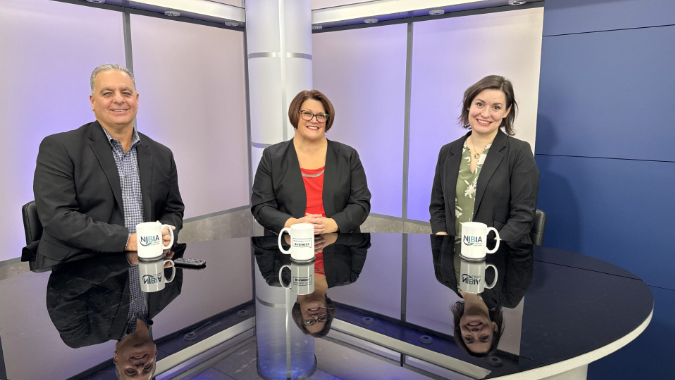Vaccines are being mandated for New Jersey healthcare providers. Vaccine passports are being required in New York City. And kids in New Jersey are now going back to school masked.
What does it all mean for New Jersey businesses on the pathway to recovery?
Quite possibly, more obstacles.
“We could be looking at some harsh realities,” said NJBIA President and CEO Michele Siekerka.
“It started with a direct shutdown of our economy because of the pandemic and now, as a result of policy changes, we could see an indirect shutdown of our small businesses by way of an extended workforce crisis or exacerbated, negative revenue impacts.”
Siekerka said New Jersey much consider how to better balance its “current COVID state” with the economic and social realities it faces – which includes an unprecedented workforce crisis and spikes in mental health concerns.
For employers, Siekerka says the divisive opinions on vaccinations put business owners and HR leaders square in the middle, and not in a position to win.
“An employer could have workers who refuse to come back to the workplace until it’s guaranteed everyone is vaccinated,” she said. “Or on the other side of the coin, you could have a segment of the workforce that absolutely refuses to get a vaccine threatening to quit if required to.
“We’ve heard both sides of the argument in the public sphere. But what it likely means for an employer is either the loss of valued employees, less productivity or even the threat of litigation.
“This is why these decisions should be left to the businesses themselves. They know the best the considerations of their work culture. They get the input from their workforce on how best to meet the needs of both,” she said.
Vaccine passports – or the policy of allowing only customers with proof of vaccination or negative COVID-19 tests – also will be burdensome to businesses and employees, Siekerka said.
“You’re now putting workers in a position to police and enforce, which, in most cases, goes above and beyond a typical job description and also creates animosity,” she said. “This definitely could result in stressed out workers leaving their jobs at a time when positions are historically challenging to fill.”
Gov. Phil Murphy has echoed similar concerns about workers enforcing vaccine passports. But even if New Jersey’s next step is a return to indoor mask mandates in places of business, Siekerka said tensions could run high.
“Picture the customer who was reluctant to get the vaccine but did so because they were told it was the fastest way to return to normal,” Siekerka said. “Now they go back to their favorite restaurant or store and are told by a worker that they’ll have to mask up again if they want to enter, or a show a recent COVID test.
“For some people, it won’t be a big deal. But for others, it’s not going to sit well. Once again, the employee is put into a role of enforcement just as customers were starting to enjoy a taste of normalcy. It’s not an enviable position for anyone to be in.”
So how should these increasing business issues be addressed?
The answers aren’t easy, Siekerka acknowledged. But after a year-and-a-half into the COVID-19’s wrath on New Jersey’s economy and way of life, she said we need to work on a more comprehensive approach rather than a strictly reactive one.
“If we’re all spreaders, whether we have been vaccinated or not, and there’s always going to be another variant down the line, we need to better balance perspective versus perception,” Siekerka said. “We need our policymakers at all levels of government to take stock of what the true impacts are, instead of focusing on the rate of spread or another data point on a graph.
“Unfortunately, and sadly, people are going to contract COVID-19. But with most being asymptomatic or slightly sick, as the data tells us, the end goal must be learning to live with this in the future versus what appears to be a goal of eradication, which is just not possible in the near term.”
Siekerka said a primary focus should be on whether healthcare systems and hospitals are being overrun with significant cases. She also made the case for deeper analyses of data accumulated over the past 17 months before diving back into restrictions and shutdowns.
“We should continue to be mindful of who is vulnerable for a more significant reaction if they contract COVID-19 and what appropriate measures should be taken for that population vs a one-size-fits-all approach, when you have more than 99% of the population susceptible to only an asymptomatic or slight case,” Siekerka said.
“And while we can and must encourage vaccines, we need to be realistic about what other mitigants exist beyond them for people who opt not to get the jab, again considering the data of who is or is not susceptible to a more significant case.
“I certainly don’t have all the answers, but I do believe that there has to be more than mandates, shutdowns, segregation and strife,” Siekerka said. “Absent our ability to frame out a more comprehensive approach, I’m concerned we’re just going around in circles without an endpoint. It’s that lack of predictability that hurts our economy, our workforce and our residents.”




